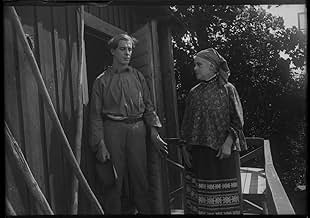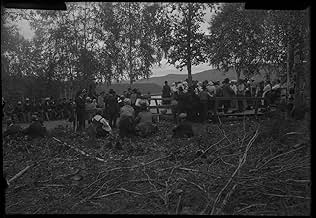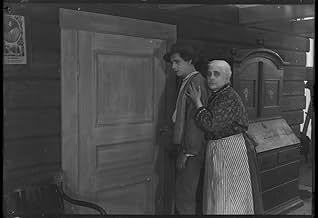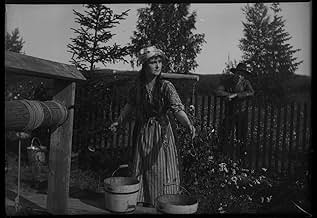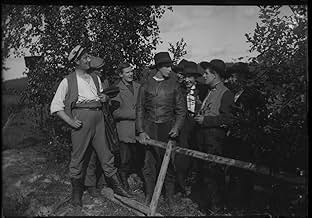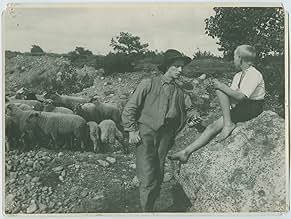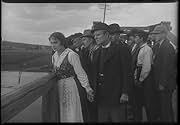NOTE IMDb
6,8/10
304
MA NOTE
Ajouter une intrigue dans votre langueOlof Koskela is the son of a rich farmer. He seduces young girls at random, until an inconsistent gesture rushes him away from home and his carefree lifestyle. Based on the 1905 novel by Fin... Tout lireOlof Koskela is the son of a rich farmer. He seduces young girls at random, until an inconsistent gesture rushes him away from home and his carefree lifestyle. Based on the 1905 novel by Finnish author Johannes Linnankoski.Olof Koskela is the son of a rich farmer. He seduces young girls at random, until an inconsistent gesture rushes him away from home and his carefree lifestyle. Based on the 1905 novel by Finnish author Johannes Linnankoski.
- Réalisation
- Scénario
- Casting principal
Ernst Brunman
- En man på kaféet i staden (1)
- (non crédité)
Arvid Dahlberg
- Flottare (1)
- (non crédité)
Bengt Djurberg
- En ung man
- (non crédité)
Emil Fjellström
- En man på kaféet i staden (2)
- (non crédité)
Mona Geijer-Falkner
- Piga på Koskelagården
- (non crédité)
Paul Hagman
- Flottare (2)
- (non crédité)
Doris Nelson
- Prostituerad
- (non crédité)
Tekla Sjöblom
- Äldre piga på Koskelagården
- (non crédité)
Olof Ås
- Flottare (3)
- (non crédité)
Avis à la une
"Sangen Om Den Eldröda Blomman" ( "Song Of The Scarlet Flower" ) was a recent and remarkable silent surprise for this Herr Von; the oeuvre is an excellent Herr Stiller silent film that this German count watched in a newly restored and tinted copy. It combines the well-known aesthetics, technical improvements and artistic merits for which the Nordic director was known and praised since those early silent times till today.
The film tells of the merry and carefree love life of young Olof ( Herr Lars Hanson ) a woodsman who during his search for true love, seduces many fauleins ( just like this German aristocrat well, not exactly because the purpose of this Herr Von's seduction of rich fräulein heiresses are their great fortunes ). He will suffer disappointment and deception, all those problems that turn up in any loving relationship. Finally he will find responsibility and maturity, learning during his particular quest that his actions always have consequences in different degrees to the people around him. This Herr Von can describe "Sangen Om " as a kind of coming of age film, the special introspective growth toward maturity of a free and easy youngster.
As this German count said before, the film displays Stiller's characteristic artistic virtues. ; in the first part of the film, we can see elements of comedy, not exactly like the comedy of intrigues in other Stiller films, but humor of a more cheerful sort, highlighting the self-involvement of our hero. Olof 's frivolous flirtations with the different girls eventually turn romantic and then turn into drama. There is conflict in the troubled relationship between Olof and his father and later with the father of his beloved. The beautiful and wild natural landscapes of Norrland and northern Sweden lend the tale a certain power and is characteristic of Herr Stiller's other silents where Nature emerges as an important character in the story. This is strongly reflected throughout the film but especially during the frantic scene wherein Olof descends into the troubled waters of a river, a beautiful metaphor for the hardships that our hero has to endure until he finds himself.
"Sangen Om Den Eldröda Blomman" is an excellent, beautiful film, a solid, technically perfect and intricate production of 1919 that demonstrates once again the importance of Herr Stiller for silent film history.
And now, if you'll allow me, I must temporarily take my leave because this German Count must return to Teutonic nature.
Herr Graf Ferdinand Von Galitzien http://ferdinandvongalitzien.blogspot.com/
The film tells of the merry and carefree love life of young Olof ( Herr Lars Hanson ) a woodsman who during his search for true love, seduces many fauleins ( just like this German aristocrat well, not exactly because the purpose of this Herr Von's seduction of rich fräulein heiresses are their great fortunes ). He will suffer disappointment and deception, all those problems that turn up in any loving relationship. Finally he will find responsibility and maturity, learning during his particular quest that his actions always have consequences in different degrees to the people around him. This Herr Von can describe "Sangen Om " as a kind of coming of age film, the special introspective growth toward maturity of a free and easy youngster.
As this German count said before, the film displays Stiller's characteristic artistic virtues. ; in the first part of the film, we can see elements of comedy, not exactly like the comedy of intrigues in other Stiller films, but humor of a more cheerful sort, highlighting the self-involvement of our hero. Olof 's frivolous flirtations with the different girls eventually turn romantic and then turn into drama. There is conflict in the troubled relationship between Olof and his father and later with the father of his beloved. The beautiful and wild natural landscapes of Norrland and northern Sweden lend the tale a certain power and is characteristic of Herr Stiller's other silents where Nature emerges as an important character in the story. This is strongly reflected throughout the film but especially during the frantic scene wherein Olof descends into the troubled waters of a river, a beautiful metaphor for the hardships that our hero has to endure until he finds himself.
"Sangen Om Den Eldröda Blomman" is an excellent, beautiful film, a solid, technically perfect and intricate production of 1919 that demonstrates once again the importance of Herr Stiller for silent film history.
And now, if you'll allow me, I must temporarily take my leave because this German Count must return to Teutonic nature.
Herr Graf Ferdinand Von Galitzien http://ferdinandvongalitzien.blogspot.com/
This is not amongst my favourite Stiller films. The whimsical style of the curious 1905 Finnish (verse?) novel on which it is based, Laulu tulipunaisesta kukasta is more than a shade irritating although, it is true, that it makes a pleasant change in some ways from the rather over-substantial diet of Selma Lagerlof that formed the basis for so many Swedish films of the period. Nor do I find Lars Hanson at his best in these more manly role in which he was sometimes cast and for which he does not really have the "carrure". As with Cocteau and Jean Marais (who was however a more genuine cascadeur), one suspects Stiller was himself more than a little starry-eyed about his young star at this point in their respective careers.
The narration in demi-detached chapters is too patchy to provide good continuity. In the distinctly dark sixth chapter, there is a fine scene where Olaf talks to himself in a mirror as though to his "double" (evidently influenced by the German classic Der Student von Prag) but, excellent though the scene is, one is not very clear on how one has arrived at that point. And the morality of the final chapter is, to say the least, odd.
The compensation is the superb (as ever) cinematography of Henrik Jaenzon and the evocation of life amongst the river log-drivers. Had there been rather more of this and rather less of Hanson's romancing, it could have been a very good film....
I shall leave this world where men are men with a touch of the equally whimsical style of Herr von Galtizen which we all know in love, in words graven on the hearts of every true Marxist*, that I shall now myself return to the closet where men are empty overcoats.
*tendance Groucho, need I say.
The narration in demi-detached chapters is too patchy to provide good continuity. In the distinctly dark sixth chapter, there is a fine scene where Olaf talks to himself in a mirror as though to his "double" (evidently influenced by the German classic Der Student von Prag) but, excellent though the scene is, one is not very clear on how one has arrived at that point. And the morality of the final chapter is, to say the least, odd.
The compensation is the superb (as ever) cinematography of Henrik Jaenzon and the evocation of life amongst the river log-drivers. Had there been rather more of this and rather less of Hanson's romancing, it could have been a very good film....
I shall leave this world where men are men with a touch of the equally whimsical style of Herr von Galtizen which we all know in love, in words graven on the hearts of every true Marxist*, that I shall now myself return to the closet where men are empty overcoats.
*tendance Groucho, need I say.
I finally got to see this after watching a clip of it in the wonderful BBC documentary 'Cinema Europe' many, many years ago.
I will admit straight up that I am a Lars Hanson fan, but, not a blinkered one, he was horribly miscast in 'The Informer' for example. However, I enjoyed this movie immensely, another fine piece of directing by Mauritz Stiller, what a loss to Hollywood, he gave them Garbo they gave him nothing in return. Beautifully shot and acted by all, it has the right atmosphere and feels like it was made when it was set. Ignore the daft observation by another reviewer about the family farmhouse, silly and pointless.
I didn't feel like I was watching a movie made over 100 years ago, imaginative at times, sad at times, but, with a hapy ending.
I don't care for reviews with innuendos about an actor's sexuality, yes, Stiller was gay, that is common knowledge, but what was his point about implying that Lars Hanson was too? What relevance is that to the movie? Oh well, it's easy to try and out the dead actors.
I will admit straight up that I am a Lars Hanson fan, but, not a blinkered one, he was horribly miscast in 'The Informer' for example. However, I enjoyed this movie immensely, another fine piece of directing by Mauritz Stiller, what a loss to Hollywood, he gave them Garbo they gave him nothing in return. Beautifully shot and acted by all, it has the right atmosphere and feels like it was made when it was set. Ignore the daft observation by another reviewer about the family farmhouse, silly and pointless.
I didn't feel like I was watching a movie made over 100 years ago, imaginative at times, sad at times, but, with a hapy ending.
I don't care for reviews with innuendos about an actor's sexuality, yes, Stiller was gay, that is common knowledge, but what was his point about implying that Lars Hanson was too? What relevance is that to the movie? Oh well, it's easy to try and out the dead actors.
This is a very modern silent movie :it looks like melodrama ,but it's not,by a long shot :it's actually an initiatory journey : a young man,the son of a wealthy farmer does soul-searching ,the first sequence is deceptive: some kind of equivalent of Vivaldi's" Spring" or Boticcelli 's "the triumph of Spring", joie de vivre oozes from every picture :"there must be a siren in these woods" .But in spite of the farandole and the dancing , he's already left his first crush (scowling)for a modest servant.
He does not really care if his dad turns him out of the valuable property : the only person he seems to care about is his mom who knows better( "you're born to destroy "),a sentence which will come back in the cemetery,but slightly modified (....and to re-build)
All along this what one could call a "road movie" before the name was invented, Olof does not know where he stands ;he tries to impress a proud woman. And then a symmetrical scene of the quarrel with his own dad : he couldn't marry a simple servant;and Killikki's dad does not want a vagrant for son-in-law ("why didn't you say who you were before?"in the second meeting)
The initiatory voyage continues with some time in town where he finds back "Gazelle " the servant he wanted to marry (more to take a rebel stand against his father than because he did love her) ,who has become a destitute girl ,living with a prostitute : like Dickens' Little Em'ly ,her dreams of a prince charming have vanished.
Like Ulysses, Olof comes back to his roots ,but he's not the same man anymore.
Stiller's pictures are luminous ,particularly in the first episode ;the very short flashbacks are smartly introduced and all the scenes on the river ,be it wild or peaceful ,are the movies' piece of resistance.
He does not really care if his dad turns him out of the valuable property : the only person he seems to care about is his mom who knows better( "you're born to destroy "),a sentence which will come back in the cemetery,but slightly modified (....and to re-build)
All along this what one could call a "road movie" before the name was invented, Olof does not know where he stands ;he tries to impress a proud woman. And then a symmetrical scene of the quarrel with his own dad : he couldn't marry a simple servant;and Killikki's dad does not want a vagrant for son-in-law ("why didn't you say who you were before?"in the second meeting)
The initiatory voyage continues with some time in town where he finds back "Gazelle " the servant he wanted to marry (more to take a rebel stand against his father than because he did love her) ,who has become a destitute girl ,living with a prostitute : like Dickens' Little Em'ly ,her dreams of a prince charming have vanished.
Like Ulysses, Olof comes back to his roots ,but he's not the same man anymore.
Stiller's pictures are luminous ,particularly in the first episode ;the very short flashbacks are smartly introduced and all the scenes on the river ,be it wild or peaceful ,are the movies' piece of resistance.
Lars Hanson quarrels with his father, the master of a generations-held , prosperous farm. He leaves, and goes on the road. He becomes a logger, pushing felled trees down rivers that are often wild, and falls in love with Edith Erastoff. At first she proudly scorns him. When he wins her favor by his bravery, riding a log down white water to a deadly falls, her father shoos him off the place.
Mauritz Stiller's early masterpiece is the story of a young man trying to prove to himself what he is, a wanderjahr over a decade. Under Stiller's careful direction, Hanson gives a varied performance that speaks well to him and the movie's story and director. While the tale is clearly missing a sequence or two -- left out of the movie at release or even earlier -- this one is quite affecting. Stiller clearly involves the audience in his story-telling, forcing them to fill in the pieces and the reasons for caring about this wild young man, based on a few tender scenes: Hanson with his mother at their parting, his courtship of Miss Erastoff, and his moments of clarity in the depths of despair. We come to understand who Hanson is just as he does.
Mauritz Stiller's early masterpiece is the story of a young man trying to prove to himself what he is, a wanderjahr over a decade. Under Stiller's careful direction, Hanson gives a varied performance that speaks well to him and the movie's story and director. While the tale is clearly missing a sequence or two -- left out of the movie at release or even earlier -- this one is quite affecting. Stiller clearly involves the audience in his story-telling, forcing them to fill in the pieces and the reasons for caring about this wild young man, based on a few tender scenes: Hanson with his mother at their parting, his courtship of Miss Erastoff, and his moments of clarity in the depths of despair. We come to understand who Hanson is just as he does.
Le saviez-vous
- AnecdotesMauritz Stiller (1883 - 1928) is, along with Victor Sjöström, the big name in Swedish silent film. He grew up in Helsinki, but traveled to Sweden at a young age, where he was active both as an actor and director. He made his directorial debut in 1912 with Mother and Daughter. During the years 1912-1916, he directed no less than 34 films, of which Vingarne (1916) is the most notable. But it was during the following years that he would make his very best films, such as Herr Arnes pengar (1919), Sången om den eldröda blomman (1919), Erotikon (1920) and the three-hour epic Gösta Berlings saga (1924), which became his last Swedish production before he traveled to Hollywood together with the film's star - Greta Garbo. He was involved in four American productions, but only Hotel Imperial (1928) was completed by himself. He then returned to Sweden where he died a short time later in the aftermath of a lung disease.
- ConnexionsFeatured in Minns Ni? (1993)
- Bandes originalesNR 1
Composed by Kristofer Stange
Meilleurs choix
Connectez-vous pour évaluer et suivre la liste de favoris afin de recevoir des recommandations personnalisées
Détails
Box-office
- Budget
- 180 000 SEK (estimé)
- Durée
- 2h 25min(145 min)
- Mixage
- Rapport de forme
- 1.33 : 1
Contribuer à cette page
Suggérer une modification ou ajouter du contenu manquant

